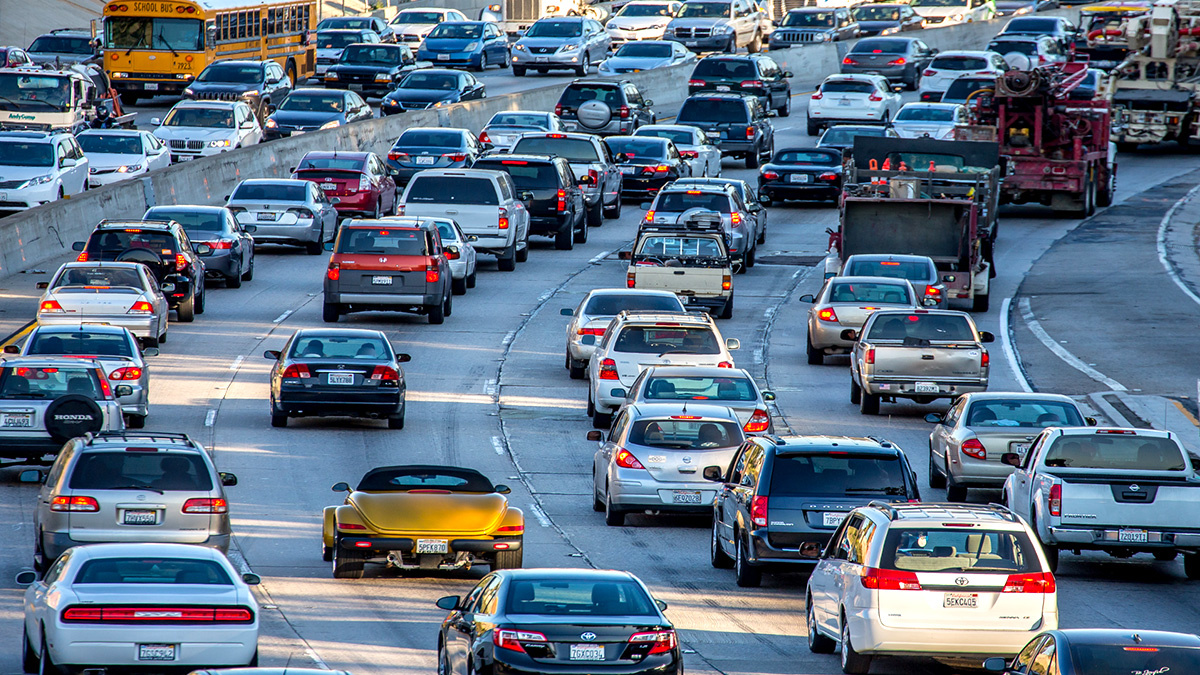
California Won’t Buy From Automakers ‘on the Wrong Side of History’ in Emissions Fight With Trump

Traffic on Highway 101 in Los Angeles, California on March 25, 2015. Eric Demarcq / Flickr
California will stop buying vehicles from the more than a dozen automakers including General Motors (GM), Fiat Chrysler and Toyota who sided with the Trump administration on the question of whether the state has the authority to set its own emissions standards, CalMatters first reported Friday.
The news came the same day that the state’s Department of General Services announced a ban on cars powered only by gas. The department said that state agencies would stop buying gas-powered vehicles immediately and would cease sales from automakers who sided with Trump in January 2020.
“Carmakers that have chosen to be on the wrong side of history will be on the losing end of CA’s buying power,” California Gov. Gavin Newsom tweeted Saturday.
California’s decision is the latest in an escalating feud between the state and the Trump administration over vehicle fuel efficiency standards designed to fight the climate crisis.
The Obama administration had proposed fuel efficiency standards that would have required carmakers to achieve an average fuel economy of 54.5 miles per gallon by 2025, removing around six billion tons of carbon dioxide over the vehicles’ lifetimes, The New York Times explained. When the Trump administration proposed capping standards at around 37 miles per gallon, California and 13 other states said they would stick to the tougher standards, potentially splitting the U.S. auto market. This led Ford, Honda, Volkswagen and BMW of North America to strike a deal with California in July and agree to build fleets averaging 51 miles per gallon by model year 2026.
The Trump administration then officially revoked California’s waiver under the Clean Air Act to set its own tailpipe emissions standards in September. California and 22 other states sued the National Highway Traffic Safety Administration the same month to block this decision, and this is when car companies like GM and Toyota filed a motion on behalf of the administration, supporting its case in the suit. California’s new ban is a response to this motion.
“It certainly sends a strong message to the automakers that have come out on the other side of California in this litigation,” Julia Stein, supervising attorney at the University of California Los Angeles Frank G. Wells Environmental Law Clinic, told CalMatters. “It’s taking steps to encourage automakers to be on what it views as the right side of that dispute.”
It is unclear how much California’s ban will impact the automakers, The New York Times reported.
Around 17 million cars and light trucks were sold in the U.S. last year, but the state of California only buys 2,000 to 3,000 vehicles annually. It currently owns 14,000 Fords, 10,000 vehicles made by GM, 4,000 by Fiat Chrysler and 1,200 by Toyota.
However, CalMatters reported that GM in particular stood to lose from the ban, since the state spent million on GM-owned Chevrolet cars in 2018. GM was also the only impacted company to give a statement to Reuters and The New York Times through spokeswoman Jeannine Ginivan:
“Removing vehicles like the Chevy Bolt and prohibiting GM and other manufacturers from consideration will reduce California’s choices for affordable, American-made electric vehicles and limit its ability to reach its goal of minimizing the state government’s carbon footprint, a goal that GM shares.”
Between 2016 and 2018, California spent .6 million on GM cars, .8 million on Fiat Chrysler vehicles, .6 million on Toyotas and million on Nissans, another company that sided with Trump, Reuters reported.
Both the ban on gas-powered cars and the ban on Trump-supporting automakers will have exceptions for public safety vehicles, according to CalMatters and The New York Times.
Also on Friday, California and 22 other states launched a parallel lawsuit against the U.S. Environmental Protection Agency, which was part of the decision to revoke its waiver, according to CalMatters.
The final Trump administration emissions standards are expected within months, according to Reuters, and are anticipated to boost efficiency by around 1.5 percent a year. This is less of an increase than both the original Obama standards and the deal California struck with the four automakers in July.
- Trump Admin Goes After States for Protecting the Environment ...
- 4 Automakers Strike Emissions Deal With California, Steering Clear ...
- California Governor Signs Order to Ban Sale of New Gas-Powered Cars by 2035 - EcoWatch
- Gavin Newsom Sued for 'Completely Unacceptable' Approval of Oil and Gas Projects in California - EcoWatch

 233k
233k  41k
41k  Subscribe
Subscribe 